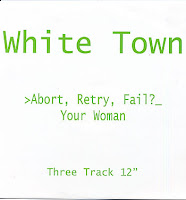
It has taken its own sweet time, as these things have a tendency to do, but it’s happened. Sometime between Billy Corgan ducking the backlash over his studio collaborations with Jessica Simpson and convincing a Veronica to reach her skinny arms around his girth, the ‘90s revival we’ve been pledged for years now, the one false-started numerous times over by companies eager to be on the tip of the wave, has happened, and seemingly organically. As with the ‘70s and ‘80s revivals of the past 15 years, it just took for people to dig deeper into the cultural nuances than were immediately presented us, to uncover the – for a time – buried or forgotten gems. To go beyond flannel and Doc Martens and guitar rock or any of the signifiers long taken over and made naff by commerce and seek out the sincerity in, at this point, the wide middle of the decade.
It has happened: the appropriation and subversion of commercial dance sounds by the likes of Bloc Party’s Kele Okereke (pictured) on his solo single Tenderoni, echoing, perhaps, the likes of Faithless. The slide into less flagrantly theatrical sounds by some of the bigger names in rock, the rekindling of good garage sounds and the hint that we’re about to enter a new stage of decent band-pop given by the likes of Cloud Control and Parades. The sense of the imminence of gothic-leaning bubblegum pop singers as the sound moves up from under.
There have been more apparent and backward-looking signs, of course: girls walking around with pale faces and the ‘wet hair’ look; skateboards back under arms, if not on the roads, and the revisitation, perhaps led by magazine editors and DJs who are at the age of having grown up in the ‘90s, of the decade’s acts. At an inner-city club recently, wall to wall with ‘trendy’ types under 20 – meaning they were born after 1990 – one of the biggest dancefloor responses was to White Town’s 1997 hit Your Woman, another to Smashing Pumpkins’ Bullet With Butterfly Wings. (Sure, I was the one inflicting at least one of those songs, but the point remains.)
 While last week The New York Times was reporting of the worst week of US album sales since Nielsen SoundScan began tracking in 1991 (the top new album was The National’s High Violet, further suggesting that non-pop acts have big sales potential in poor sales climate due to the dedication of their audiences to buying music – though the top seller was still the Bieber) and Jake Gyllenhaal put himself forward to play Kurt Cobain in an inevitable biopic (hmmm), the NME online was tallying reader votes on the best albums of the ‘90s. The shortlist contained a pretty decent wack of acts, from Ride to Air to REM and The Lemondheads. Lots were missing, passed over in favour of more ‘known’ bands – Arab Strap and Gorky’s Zygotic Munci and Throwing Muses and Placebo (YES, Placebo); the first probably due to some kind of ‘popularity’ criteria, the last because, due to recent crimes against aging, it’s not yet OK to applaud their early work.
While last week The New York Times was reporting of the worst week of US album sales since Nielsen SoundScan began tracking in 1991 (the top new album was The National’s High Violet, further suggesting that non-pop acts have big sales potential in poor sales climate due to the dedication of their audiences to buying music – though the top seller was still the Bieber) and Jake Gyllenhaal put himself forward to play Kurt Cobain in an inevitable biopic (hmmm), the NME online was tallying reader votes on the best albums of the ‘90s. The shortlist contained a pretty decent wack of acts, from Ride to Air to REM and The Lemondheads. Lots were missing, passed over in favour of more ‘known’ bands – Arab Strap and Gorky’s Zygotic Munci and Throwing Muses and Placebo (YES, Placebo); the first probably due to some kind of ‘popularity’ criteria, the last because, due to recent crimes against aging, it’s not yet OK to applaud their early work. Sitting at the top was a fairly obvious but not undeserving bunch: Blur, Oasis, Nirvana and, at #1, Radiohead’s OK Computer, an album that sums up the widely publicised but not altogether incorrect sentiment of the decade’s teenaged generation; the revisited distopian view, which is better than the cynicism of that view that came after and is still held, even though, arguably, Muse will serve the same function to many of the past decade’s teen set.
Unsurprisingly not on the shortlist for obscurity (in the UK at least) reasons were The Paradise Motel (pictured), a band who breathed life into the quiet-loud rural-gazing by Australian bands in the ‘90s and are having a rejuvenation of their own with a new line-up and their first album since disbanding in 2000. The album, Australian Ghost Story (out through Left Over Life To Kill Records on 11 June) is a sepia-toned and engaging telling of the Azaria Chamberlain story, a tale perfectly suited to their dusty, imperfect rock. They also cleverly get away with not being a part of any ‘90s rehash while landing in the middle of it – a record released in 2010 about something that happened in 1980 from a band who weren’t active in the decades following or preceding those dates. Talk about taking their sweet time.
No comments:
Post a Comment